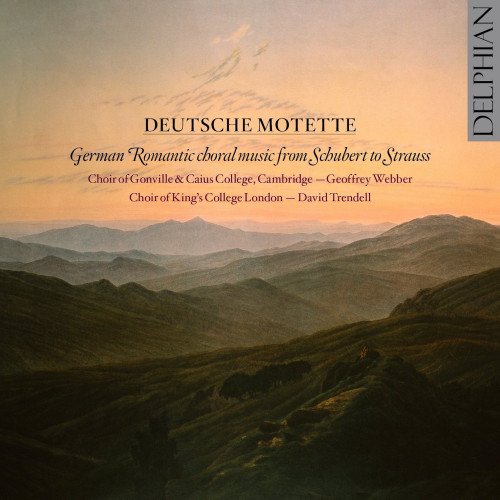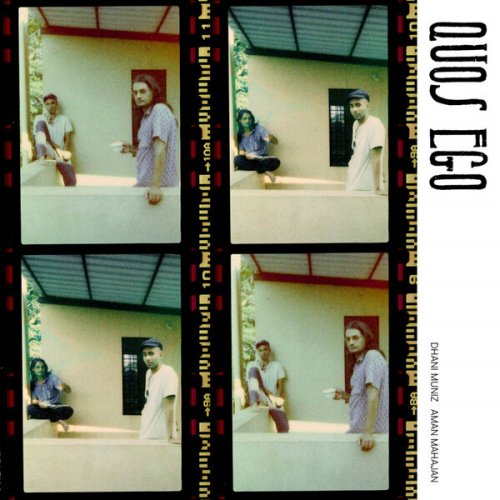Choir of King's College London, Choir of Gonville, Caius College, Cambridge - Deutsche Motette (2013) [Hi-Res]

Artist: Choir of King's College London, Choir of Gonville, Caius College, Cambridge
Title: Deutsche Motette
Year Of Release: 2013
Label: Delphian Records
Genre: Classical
Quality: FLAC (tracks) 24/48, FLAC (tracks)
Total Time: 01:01:26
Total Size: 626 / 269 MB
WebSite: Album Preview
Tracklist:Title: Deutsche Motette
Year Of Release: 2013
Label: Delphian Records
Genre: Classical
Quality: FLAC (tracks) 24/48, FLAC (tracks)
Total Time: 01:01:26
Total Size: 626 / 269 MB
WebSite: Album Preview
01. Richard Strauss
01. Deutsche Motette, Op. 62 - [18:16]
02. Robert Schumann
Vier doppelchörige Gesange, Op. 141 -
02. I. An die Sterne - [04:48]
03. II. Ungewisses Licht - [02:12]
04. III. Zuversicht - [03:32]
05. IV. Talisman - [04:47]06. Franz Schubert
06. Gott ist mein Hirt, D. 706 - [05:33]
07. Johannes Brahms
07. O Heiland, reiß die Himmel auf, Op. 74, No. 2 - [04:54]
08. Josef Rheinberger
08. Abendlied, Op. 69, No. 3 - [03:01]
09. Peter Cornelius
Liebe, Op. 18 -
09. I. Liebe, dir ergeb' ich mich - [05:21]
10. II. Ich will dich lieben, meine Krone - [03:52]
11. III. Thron der Liebe, Stern der Güte - [05:20]
Given its prominence in musical life in the 19th century, even in medium-sized American cities with significant German populations, German Romantic unaccompanied choral music is underrepresented in recordings and concert repertory. Any decent recording is welcome, and one like this, with top-notch choral work, has the potential to be a real find. This one works better in pieces than as a whole, but at its best it's very good indeed. The real find here is the set of Deutsche Motette by Richard Strauss, set in 1913 to texts by Friedrich Rückert. These are rarely performed for the simple reason that they are crushingly difficult; they are beyond the reach of the semi-amateur groups that make up the majority of performing choral ensembles. Think of, say, Death and Transfiguration as an unaccompanied choral work. The sopranos are given punishing long stretches at the very top of their range, and the simple wonder of the texts is pushed into some very murky territory. The Choir of Gonville and Caius College under David Trendell copes with these challenges very impressively, and as sheer vocal virtuosity in a tradition that must have been a bit unfamiliar for the choristers the performance is stunning. The rest of the music, by well-known composers (Schubert, Schumann, Brahms) and lesser but worthwhile ones (Rheinberger and the intriguing Peter Cornelius, who tried to cope with Wagner's example), is of a different sort: it reflects a close relationship with poetry, and it is written for ordinary mortals. Except for the Cornelius work, these are performed by a different choir and conductor, the Choir of King's College London under Geoffrey Webber. Thus the album as a whole consists in two ways of two different parts, but the chance to hear the Strauss done so well is worth the purchase price by itself: it will give workaday choristers a chance to hear what is possible with a great deal of work, which is what is on display here.
![Bill Champlin - Through It All (1994) [Japanese Edition] Bill Champlin - Through It All (1994) [Japanese Edition]](https://www.dibpic.com/uploads/posts/2026-02/1771699229_ff.jpg)





![WILLOW - petal rock black (2026) [Hi-Res] WILLOW - petal rock black (2026) [Hi-Res]](https://www.dibpic.com/uploads/posts/2026-02/1771525134_cover.jpg)
![Susie Philipsen - Sunday Kissing Club (2026) [Hi-Res] Susie Philipsen - Sunday Kissing Club (2026) [Hi-Res]](https://www.dibpic.com/uploads/posts/2026-02/1771738386_500x500.jpg)
![Anna Kolchina - Reach for Tomorrow (2026) [Hi-Res] Anna Kolchina - Reach for Tomorrow (2026) [Hi-Res]](https://img.israbox.com/img/2026-02/19/quc4em3qn6fgke1rwewkbdxg5.jpg)